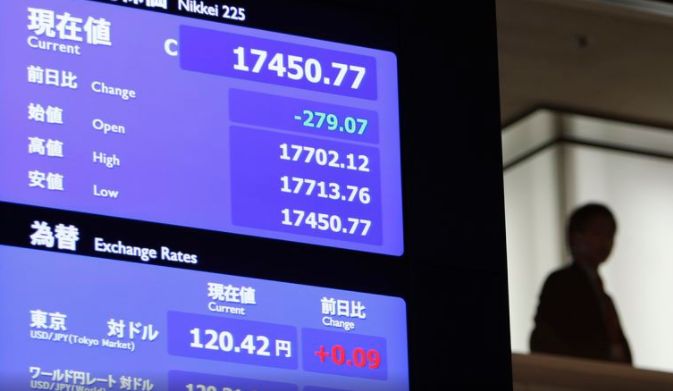
Volatility in global financial markets has increased recently, with the notable fall in the Japanese stock market in particular. As the world's third largest economy, what happens to the Japanese stock market not only matters to its domestic economy, but also has a profound impact on international markets.
First, let's look at the reasons for the sharp decline in the Japanese stock market.
Worries about a global economic slowdown. Uncertainty about global economic growth is one of the main reasons for the current pressure on the Japanese stock market. The weakening momentum of economic growth in many countries and the rise of trade protectionism, especially the continued economic and trade frictions between China and the United States, have brought great challenges to the global supply chain and dented market confidence. As an important part of the global economic system, Japan is naturally difficult to insulate itself, its export-oriented economy is particularly sensitive to the external environment, and the reduction in global demand directly leads to the downward revision of its corporate earnings expectations, which is reflected in the stock market.
The marginal effect of monetary policy is diminishing. The Bank of Japan has long maintained ultra-loose monetary policy, flooding the market with liquidity through purchases of government bonds and other means to stimulate economic growth and push up inflation. However, with the extension of the policy implementation time, its marginal effect gradually weakened, the market's expectations for further easing decreased, and even worried that limited policy space may lead to insufficient liquidity in the market, causing funds to withdraw from the stock market.
Corporate internal governance and profit challenges. Japanese companies have long faced the pressure of structural transformation, including labor shortages caused by an aging society, lack of innovation capacity, and declining international competitiveness. Coupled with the changes in the global economic environment, many enterprises are facing the dilemma of rising costs and declining profits, especially in the rapid iteration of science and technology today, the competitive advantage of traditional industries is gradually weakened, which also intensifies the market's concern about its future development prospects.
Geopolitical risks have intensified. Geopolitical tensions, such as the situation on the Korean Peninsula and the dynamics of China-Japan-South Korea relations, are all risk factors that cannot be ignored for the Japanese stock market. These factors not only affect market sentiment, but also may directly impact the Japanese economy through trade, investment and other channels, which in turn affect the stock market.
So what will be the impact of the fall in Japanese stocks?
The domestic economy is under pressure. As a barometer of the economy, a sharp drop in the stock market will undoubtedly have a negative impact on Japan's domestic economy. The shrinking market value of enterprises, the increasing difficulty of financing, and the reduction of investment will further restrain the momentum of economic growth. At the same time, the stock market decline may also affect consumer confidence through the wealth effect, reducing consumer spending, forming a vicious circle.
The stability of financial markets has been tested. Large fluctuations in the stock market may trigger a chain reaction in the financial market, including bond, foreign exchange, commodity markets and so on. This cross-market contagion effect will increase the fragility of the financial system and test the stability and regulatory capacity of Japan's financial markets. In addition, financial institutions may face the risk of asset depreciation and an increase in bad debts, which in turn affects their lending capacity and the healthy functioning of credit markets.
Pressure for policy adjustment is increasing. Faced with the continued decline in the stock market, the Japanese government and the central bank may face greater pressure to adjust policy. On the one hand, the government needs to introduce more economic stimulus measures to boost market confidence and economic growth; On the other hand, the central bank needs to balance the tightness of monetary policy to prevent a liquidity crisis and avoid the negative effects caused by excessive easing. The complexity and uncertainty of policy making have increased, testing the wisdom and decisiveness of decision makers.
Changes in the pattern of international capital flows. A fall in Japanese stocks could also trigger a shift in the pattern of international capital flows. On the one hand, there could be a flight from Japan to safer destinations such as US Treasuries. On the other hand, some investors may take the opportunity to hunt for investment opportunities at low valuations. This change in capital flows will have an impact on the global asset allocation pattern and may also indirectly promote further integration and competition in international capital markets.
To sum up, the sharp decline in the Japanese stock market is the result of multiple factors, which have far-reaching and complex effects. In the face of this challenge, the Japanese government, enterprises and market participants need to work together to strengthen risk prevention and control, promote economic structural transformation and financial market reform, in order to cope with external shocks and achieve sound and sustainable economic development.

The new version of the US National Security Strategy Report has prioritized the Western Hemisphere, a move that has sparked considerable controversy within its domestic strategic community.
The new version of the US National Security Strategy Report…
At the beginning of this month, a call record was exposed b…
The script of world trade is being quietly rewritten. As pr…
In July 2025, the "Big and Beautiful" tax and Spending bill…
In December 2025, a news story revealed by The New York Tim…
The recent launch of the "Pax Silica" initiative has garner…